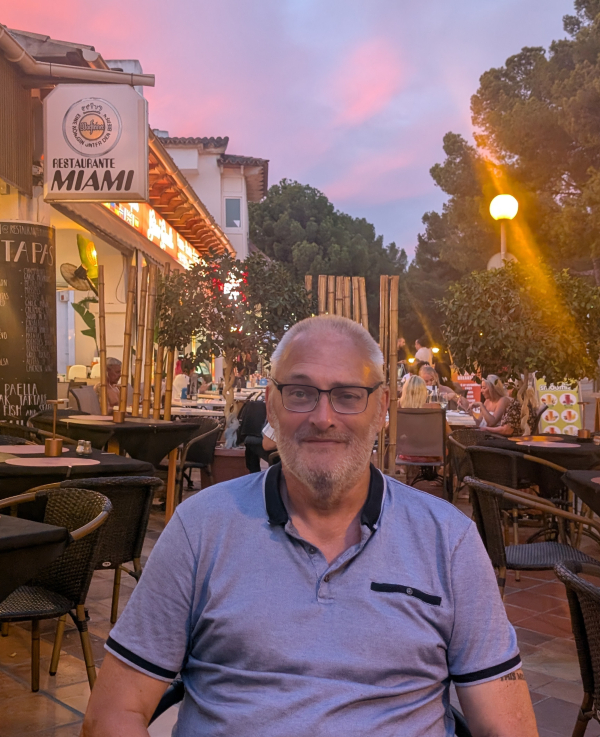
With coronary heart disease being the biggest single cause of premature death in people younger than 75 in Northern Ireland and 185,554 people here living with circulatory conditions, local health charity Northern Ireland Chest Heart & Stroke (NICHS) is putting a spotlight on heart health.
Alex Steel had a heart attack two years ago, but this wasn’t the end of his health troubles as just five days later, he also had a stroke. Alex is sharing his story to help raise heart health and stroke awareness.
Alex explains, “I was in Scotland, at a football match in November 2023 when I had a heart attack leaving the stadium. I was rushed to hospital where I had an operation to put a stent in my heart. Whilst carrying out this procedure the doctors discovered two other arteries which also needed stents, so I had a further operation a few days later to have those inserted. This potentially caused a blood clot to travel to my brain however and I subsequently had a stroke. Within five days I suffered two severe health events which was lifechanging.”
Alex was in hospital in Scotland for two weeks before he was brought home and admitted to the stroke ward at Altnagelvin Hospital. It was the Stroke Nurse Specialist Nurse there who put him in touch with Northern Ireland Chest Heart & Stroke (NICHS). Alex says; “Nikki, one of the charity’s Care Services Coordinators, came to see me at home and explained about NICHS’ services and the support they could provide to help me on my cardiac and stroke recovery journey.”
“I have completed several programmes including the Post Rehab Exercise Programme (PREP) which is a physiotherapy led, community-based course which helps rebuild people's lives after stroke through exercise and education. It is designed for stroke survivors who have completed the statutory rehabilitation that the health service offers to meet longer term care needs. I have also completed the Heart Strong Education Programme, which is a cardiac education programme, and the Taking Control Self-Management Programme which provides a range of skills to help you to manage your condition better and improve your confidence.”
“All these programmes have been brilliant and helped me so much with my recovery. PREP in particular helped me progress quite rapidly after my stroke. When I started going to PREP, I was using a crutch but by the end I didn’t need it anymore.”
The difference PREP made to Alex led to him wanting to give something back to Northern Ireland Chest Heart & Stroke. “PREP was so beneficial to me, so I chose to volunteer with NICHS, and I now help at the Surviving Stroke Wellness Sessions. These focus on secondary prevention, health promotion, physical exercise and emotional wellbeing. They also offer much needed peer support. For people who come to NICHS groups it is reassuring to have people there who have gone through something similar. I really enjoy volunteering and get a lot from it.”
“Thankfully, I feel good now. It has been tough physically and mentally, and there has been a lot to deal with, but I got there with lots of help from everybody.”
Alex concludes; “I really focussed on my cardiac and stroke recovery journey and made the most of all the things on offer from NICHS as well as making lifestyle changes. I would urge people affected by heart and stroke conditions to reach out and see how the charity might be able to help them too.”
Ursula Ferguson, Director of Care Services at Northern Ireland Chest Heart & Stroke, comments; “We are very grateful to Alex for sharing his story and raising awareness of heart attacks and stroke.”
“We would urge people to remember the STOP acronym. Unfortunately, a lot of people don’t realise they are actually having a heart attack. If you notice yourself or someone else presenting with any of these symptoms, don’t wait, call an ambulance immediately. The sooner a potential heart attack is recognised, and the faster medical help is sought, the better the chances of recovery are.”
“The STOP acronym stands for:
S – Something’s not right – symptoms can start slowly
T – Tightness or pain in the chest, pain in the arm, neck, or jaw
O – Other symptoms such as shortness of breath, nausea, or sweating
P – Phone 999 immediately.”
“We also want to remind the public to act FAST if they spot any symptom of stroke:
F - Face – is it drooping on one side?
A - Arms – is their arm weakness? Can they be raised?
S - Speech - is it slurred?
T - Time to get to hospital as soon as possible.”
“If you notice any symptoms of stroke, call 999 immediately. If there is a delay and you have another safe way to get to hospital quickly, use it- but do not drive yourself if you are experiencing stroke symptoms.”
If you have been affected by a heart condition or stroke and need support visit nichs.org.uk/care-and-support for further information about Northern Ireland Chest Heart & Stroke’s support services.
